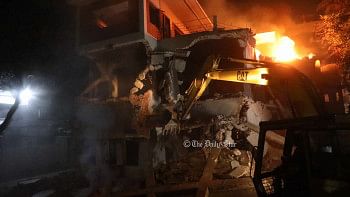If war wins, climate action loses

The Ukraine war is a tragedy of tragedies, catastrophic for the Ukrainian people, a disaster for the global economy and a real setback for global peace and stability. The emotional fog of war is such that most commentary is about who wins, who loses and who is right or wrong. The inconvenient truth is that perhaps we will all lose, with little upside unless we start de-escalating everything.
The war has swept aside concerns about the pandemic, with intense focus on how to defeat the enemy. The speed and ferocity of the war caught almost everyone by surprise, so we have few clear-headed assessments of comprehensive short- and long-term implications on the global economy, finance, trade and development. Those who care about climate warming, as I do, would like to ponder what the war means for the fragile agreement on climate action decided in the Glasgow COP26 last November.
With the return of great power conflict in 2014 and the eruption of the Ukraine war this year, the world's attention will be diverted from climate change towards preparing for war.
Make no mistake, there is a direct connection between military spending and carbon emissions. The US accounted for 24 percent of total NATO military spending in 2021, or an estimated USD 811 billion. The Brown University Watson School of International & Public Affairs estimates that the US Department of Defense is "the world's largest institutional user of petroleum and correspondingly, the single largest institutional producer of greenhouse gases (GHG) in the world. In 2017, for example, the Pentagon's total greenhouse gas emissions (installations and operations) were greater than the greenhouse gas emissions of entire industrialised countries, such as Sweden, Denmark and Portugal."
In short, increased defence expenditure will accelerate energy and non-renewable material consumption, absorb the best talents in war efforts, increase carbon emissions, thus diverting scarce resources away from climate action.
How urgent is the climate disaster? The UN Secretary General called 2021 the "make it or break it year" for global climate action. He quoted scientists to say the world must cut global emissions by 45 percent by 2030, compared with 2010 levels, to avoid the most catastrophic impacts of climate change.
Instead, for 2022 alone, the UN has estimated that it will need USD 1.7 billion to support and provide essential supplies and services for people in Ukraine, including an anticipated four million Ukrainian refugees.
We have been witnessing bushfires in California and Australia, flash floods in India and Indonesia, volcanic eruptions and earthquakes that are unprecedented in scale and intensity.
On top of all this, Russia accounted for 10 percent of world oil supply gas output and 26 percent of world wheat production. The price of oil has risen to just under USD 139 per barrel, and wheat, grain and palm oil prices are at record highs. Countries that were hoping to cut fuel subsidies will now have to cushion energy shocks, whilst coping with higher defence expenditure and increasing social spending to alleviate rising poverty already worsened by the pandemic. All these in the midst of surging inflation and slowing global trade, disrupted by supply chain choke points and war.
In 2021, the World Scientists' Warnings into Action, Local to Global, signaled a global Climate Emergency in energy, atmospheric pollutants, nature, food, population and economy. Unfortunately, war has torpedoed collaborative efforts because political stability is being disrupted.
We need to be realistic that the 17 UN Sustainable Development Goals (SDGs) are very high-level goals requiring detailed design, implementation and action on hundreds of thousands of Environmental, Social and Governance (ESG) projects and programmes at local levels. Most emerging markets lack the talent, funding and capacity to implement these effectively. It is easy to call for a "Global Marshall Plan" for civilisation. But with war, it is likely that Europe will prioritise a Marshall plan for restoration of the Ukrainian economy first. Who will fund the Climate Action by developing countries in Africa and developing Asia and Latin America?
Like all crises, war has divided the world into those who are rich and protected, and those who are poor, vulnerable and insecure. This is no longer a zero-sum game, but a vicious downward spiral of conflict, failing governance and climate-driven natural disasters.
Before the war gets too hot, we need cool heads and warm hearts to reflect why we need de-escalation for peace and the existential survival of all humanity.
Andrew Sheng is adjunct professor at Tsinghua University, Beijing and the University of Malaya. He was formerly the chairman of the Securities and Futures Commission, Hong Kong.
Copyright: Asia News Network


 For all latest news, follow The Daily Star's Google News channel.
For all latest news, follow The Daily Star's Google News channel. 



Comments